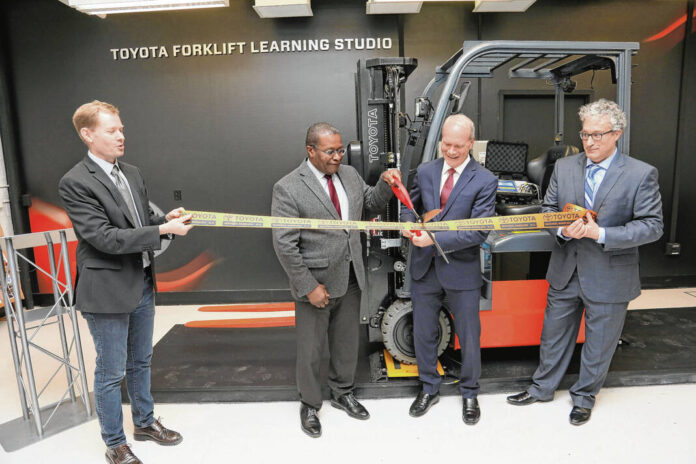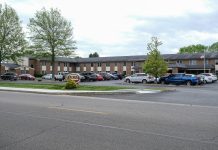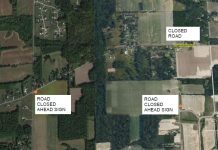
Photo provided Representatives from Toyota Material Handling and Cornell University’s College of Engineering officially dedicate the new Toyota Forklift Learning Studio. Pictured left-right are: David Erickson, S.C. Thomas Sze Director at Cornell’s Sibley School of Mechanical and Aerospace Engineering (MAE); Lynden Archer, the Joseph Silbert Dean of engineering at Cornell; Brett Wood, President and CEO of Toyota Material Handling North America; and Brian Kirby, MAE’s Associate Director of Undergraduate Affairs.
ITHACA, New York – Toyota Material Handling (TMH), North America’s leading manufacturer of forklifts and material handling solutions, joined representatives from Cornell University’s College of Engineering to officially dedicate the revolutionary Toyota Forklift Learning Studio at Cornell University’s Sibley School of Mechanical and Aerospace Engineering.
This is the world’s first Forklift Learning Studio and the result of a unique partnership between TMH and Cornell, bringing students a creative outlet for real-world application in a revolutionary and immersive learning experience that could become a model for impactful change in higher education.
“At Toyota, we believe making things is about making people, and this learning studio is a great example of that guiding principle,” said Brett Wood, Toyota Material Handing North America President and CEO. “Young people often wonder how they’ll use certain theories in their professional lives because it’s often difficult to connect the dots. In the innovative Toyota Forklift Learning Studio, all of the ‘dots’ will exist in the same space as the finished product. This connects perfectly to our Toyota culture of continuous improvement by giving Cornell Engineering students a place for continuous learning and allowing them to explore ways to apply that learning in the real world.”
This state-of-the-art learning studio is equipped with industry-leading products, components and technology that will bridge the gap between students’ coursework and actual commercial products. The forklifts will help students learn about mechanical properties and how they integrate into a larger system while exposing them to many elements of engineering principles like fluid mechanics, heat transfer, hydraulics, engines, transmissions, motors and more. This experimental-learning space, designed with the latest in forklift innovation, encourages outside-the-box thinking, intellectual exploration, and empowers students with a real-life application of the theories taught in classrooms that supports a modern approach to education that balances lecture and lab sessions.
“I became passionate about this when it became clear to me that students were motivated by seeing how what they learned in class applied to their everyday life and to their career opportunities, and they didn’t want to wait very long to get to that point,” said Brian Kirby, associate director of undergraduate affairs for Cornell’s Sibley School of Mechanical and Aerospace Engineering. “The idea behind the forklift learning studio was to lead with the application, and then use that as a framework to decide how it could be linked together in the different classes we teach.”
Kirby says the Toyota Forklift Learning Studio will incorporate between seven and 12 different classes, with students going back and forth between the studio and other parts of the curriculum.
“We want students to interact with the studio constantly, and we want to influence a larger number of students,” Kirby said. “Unlike a single class, which can only affect 10 to 100 students, this space will impact hundreds and hundreds of students and allow them to see the links between what they’re doing and what they can actually become. I believe students will see the Toyota Forklift Learning Studio as a fun and exciting place that motivates them to put their energy and passion into studying the foundational material we’re teaching – a place where the coolest things happen on campus.”
The Toyota Forklift Learning Studio will not only change the educational experience for engineering students at Cornell – it could become a model for universities across the country, Toyota officials said. It challenges the traditional ideology of doing things a certain way because that’s how they’ve always been done, and provides a clear answer to the age-old question students ask: ‘When will I ever use this in the real world?’
“I wish I had a learning studio like this when I was studying mechanical engineering many years ago,” Wood said. “To be able to get your hands on a commercial product and learn about direct applications for engineering theory and principles would’ve been a life-changing experience. I really hope this can help the engineers of tomorrow get out into the workforce and better understand the basic and even the more complicated engineering principles they learn in a classroom. We believe this is a revolutionary shift in the way students learn, and Toyota is so proud to be at the forefront of impactful change.”
Students taking advantage of this cutting-edge learning experience benefit from having complex systems and individual components all in one place, enlightening students with a holistic perspective of the engineering process and the ability to see how the application of science and mathematics comes together to create an essential product, according to organizers.
“The cool thing about the studio is seeing how everything you’ve learned in separate classes can be integrated into one thing,” said Cornell University sophomore Emma Sudmann, who was selected to help build the studio last summer. “It can be hard to see how everything you learn in your statics class compares to your fluid mechanics class, for example. But with the forklift, you can see how all of those topics come together and how they are used in the real world.
“This experience has definitely opened my eyes to so many different possibilities, and things I had never thought you could do with engineering. It’s so cool to be part of something that will not only impact engineering but could be a model that impacts how all students learn in the future.”
In addition to modernizing the way students learn, the mutually beneficial partnership will expose students to new products and industries where they could build successful careers. The forklift industry is an essential part of the nation’s supply chain, and it is coming off the two best years in history – with a combined 663,000 units sold in North America in 2021 and 2022. The industry contributes more than $26 billion to the United States’ annual GDP and offers wide-ranging opportunities for engineers.
“We’re grateful for our partnership with Toyota Material Handling which allows us to better prepare our students for their future careers by cultivating a deep understanding and appreciation of engineering while instilling values in them that encourage a curious mind and a drive to continuously improve,” Kirby said. “Since the beginning of our partnership with Toyota, our collaborations have grown deeper and more vibrant, and our philosophical connections have become more and more clear. We couldn’t be more excited about the future of this learning studio and our partnership with Toyota.”




